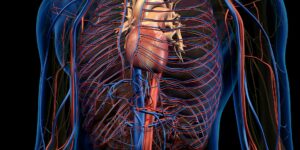Did you know that heart disease is the leading cause of death for adults in the U.S.? Thankfully, vascular screenings starting at around age 50 can help check your risks and ensure you get much-needed treatment to protect your health.
Vascular screenings are tests to check the health of your blood vessels and arteries. At Evansville Surgical Associates, we specifically look at the health of your carotid artery, peripheral arteries, and abdominal aorta to determine your risks. Those with risk factors for vascular diseases are good candidates for testing. You can help protect your heart health by making positive lifestyle changes.
What are Vascular Screenings?
Vascular screenings are essential for assessing your risk of health problems stemming from your blood vessels and arteries. They make up the “vascular” part of your cardiovascular system, which is how your veins, arteries, and heart pumps blood throughout your body.
With a vascular screening, our vascular technologists can detect the warning signs of cardiovascular disease, which can manifest as a heart attack or stroke, as well as abdominal aortic aneurysm. Vascular screenings are necessary for catching these health issues early. This allows you to get the treatment you need in order to live a long and healthy life.
What Is Involved in Vascular Screening?
At Evansville Surgical Associates we offer screenings related to three specific vascular conditions:
- Carotid artery disease
- Peripheral arterial aneurysm
- Abdominal aortic aneurysm
Vascular screening cost can vary depending on how many you get. They are $35 individually but you can get all three for $100.
Carotid Artery Disease
For this screening, we use ultrasound to check for the presence of any fatty deposits in your carotid artery. It’s located in your neck and can increase your risk of stroke if blocked.
Peripheral Arterial Aneurysm (PAD)
PAD is a condition where arterial plaque affects blood flow in your extremities such as the legs and feet. We can test for the condition noninvasively by checking the blood flow in your ankles.
Abdominal Aortic Aneurysm (AAA)
AAA occurs when your arterial wall gradually balloons, reducing blood flow and risking an eruption. AAA screenings are critically important, as the condition is life-threatening and often detected too late.
Click here to read our blog about why you should get screened for AAA, especially after age 60!
Do I Need a Vascular Screening?

You should consider getting a vascular screening if you have risk factors for a vascular disorder. This includes a family history of aneurysm, PAD, or stroke. Screenings should begin during your 30s if you have a family history, especially if other risk factors are present.
Common risk factors associated with complications include:
- Past or current high blood pressure
- Being overweight or obese
- A history of tobacco use
- Sedentary lifestyle
- High cholesterol
- High stress
- Diabetes
You may also be advised to get a vascular screening if you’re experiencing an issue such as unexplained chest pain. Other tests such as stress tests may be recommended along with your screening.
To read our blog on the effects of smoking and tobacco use on your veins and arteries, click here!
The Benefits of Vascular Screenings
The biggest benefit of vascular screenings is finding health problems you weren’t aware of. They are one of the few non-invasive and effective tools to establish your risk for certain conditions.
As data is gathered from your screenings, your doctor can recommend treatments to help avoid health problems later on. More screenings may be recommended later on to determine how the treatments are working.
How to Protect Your Heart Health
Heart disease is more common than you may think. Fortunately, there are steps you can take to reduce your risk of heart disease and avoid an appointment with a vascular surgeon.
You can get started by making simple changes to your lifestyle such as:
- Eating a heart-healthy diet
- Getting exercise every day
- Limiting your alcohol consumption
- Keeping your blood pressure below 120/80 mmHg
- Maintaining a healthy weight
- Keeping your blood sugar at a healthy level
- Keeping your cholesterol at less than 200 mg/dL
- Managing stress
- Quitting smoking
By making these positive lifestyle changes you will be helping protect yourself from vascular problems for years to come.
Do you need to schedule a vascular screening? Call us today at (812) 424-8231 or (800) 264-8231 to schedule your appointment!
Vascular screenings are an important tool for checking the health of your arteries and blood vessels. Our team specifically focuses on your abdominal aorta, carotid artery, and peripheral arteries to assess your risks. Good candidates for testing will have risk factors for vascular disease and can help protect themselves by making healthy lifestyle changes.
Evansville Surgical Associates has been providing comprehensive and compassionate surgical care for over 50 years. Call us at (812) 424-8231 or (800) 264-8231. We are available from 8:00 am to 4:30 pm if you would like to schedule an appointment.



